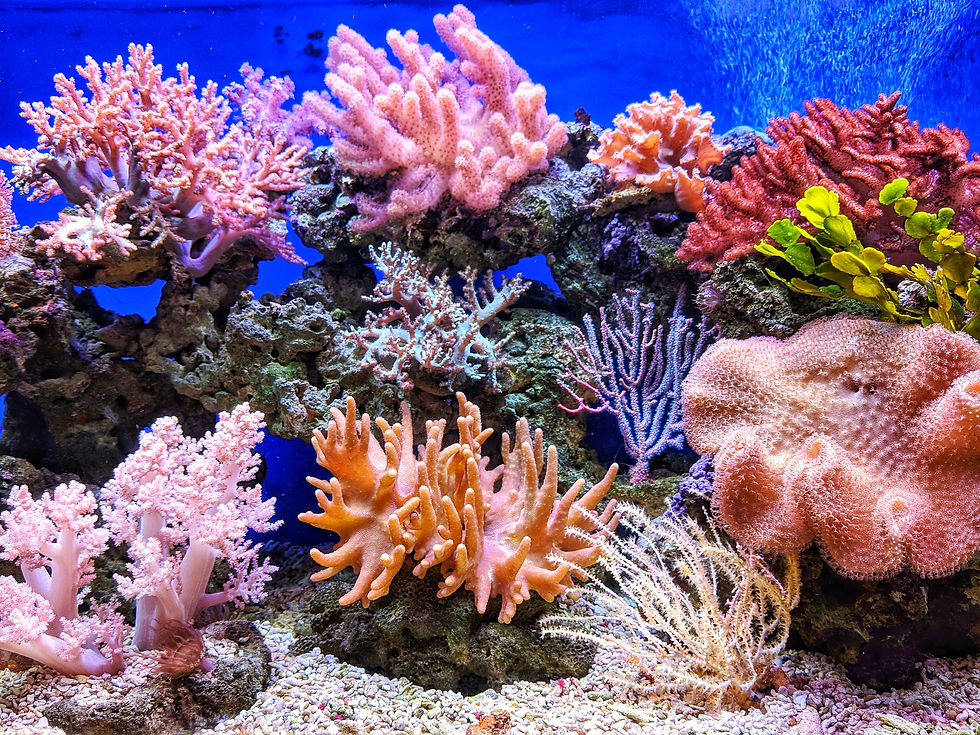Three Ways That You Can Help Reduce Micro-Plastics in Our Oceans
- Emily Aitken

- Jun 18, 2021
- 4 min read
Updated: Aug 16, 2021
It’s possible to question; ‘what do our oceans and fashion have in common?’ Well, it is certainly not a positive connection. In 2019, there were an estimated 1.4 million trillion pieces of micro-plastics in the ocean.
This figure is completely unfathomable, so much so that I’m unsure as to how many written zeros would appear in such a number. But this tragic statistic is because plastic materials make up much of the clothing we buy.
Polyester, nylon, and acrylic materials are cheap and durable. As a result they are perfect materials for large fast-fashion companies to use, which makes the fashion industry the second most polluting industry globally.
Micro-plastics have made their way into our food chain because fish and sea life consume the microscopic material as they mistake it for food. Ingestion leads to starvation, and irreversible damage to digestive systems and possible extinction. So the effects of micro-plastics are disastrous.
What can you do to reduce micro-plastics?
Oceans are not only vital for our survival, but they are also a beautifully diverse ecosystem that should be protected.
It’s important to know how you can take action to prevent the situation from worsening. So, here are four doable actions and changes that you can make to help reduce plastic pollution in our oceans:
1) Reducing the need to buy fast fashion
This change is the most obvious but more than likely the hardest to commit to, because the service is so understandably tempting. It’s Thursday night, but you still don’t have an outfit for that birthday party on Saturday – no problem! Hop on to the plethora of fashion websites and grab a dress for £11.
However, the UN has directly highlighted the negative environmental impacts of fast-fashion companies. So our own habits need to change.
Second hand markets like Depop and Vinted are perfect ways to purchase those same items from large fashion brands without buying them directly. The material for a jumper on Depop has already been made – there is no need to use more water, use more dye, or create more plastics to make another one.
However, delivery times on these independent selling sites can depend on the seller, so make yourself organised to look your best at upcoming events!
So while the low prices and fast delivery are tempting; instead prepare for your events, buy sustainably, and throw out throw-away culture!
For more information about how you can help reduce the effects of fast fashion, click here.
2) Buy from sustainable clothing companies
However, we at Mindless Mag would never want to stop you from buying new and gorgeous clothes, of course! We just ask that you keep in mind the damaging effects that over-buying fast fashion products has on our oceans.
There are so many more sustainably focused fashion brands that deserve a place in your wardrobe. These brands dedicate themselves to using non-plastic materials, which means there are less micro-plastics filling up our oceans.
The fashion brand Reformation have developed an innovative material called ECONYL. This is material that’s regenerated nylon and rescued waste from our oceans, such as fishing nets. Reformation also opt to use wood-based fibres, such as viscose and TENCEL Modal rather than plastic-based ones. Wood-based fibres are definitely less likely to do as much damage as plastic to our ocean life.
Stunning and sustainable clothing, what more could you want?
Ethical brands like Reformation do tend to be more expensive than typical fast-fashion brands, but, the higher prices are worth it to secure a safer future for our oceans.
3) Reduce micro-fibres in our washing
The problem of polluting our oceans does not just rest on the effect of fast fashion products. Washing the clothes that we already own releases tiny micro-fibres into larger bodies of water, and the wastewater from washing machines travels into lakes, rivers and oceans.
But of course, clean clothes are necessary. So what else can we do?
Washing bags specifically designed to prevent micro-fibres from entering the water are a handy and innovative solution. Guppyfriend is one of many companies who have developed these types of washing bags, which are designed to catch micro-fibres that are 0.001cm thick – pretty effective!
The bags are long lasting too, withstanding 50 washes on average. Guppyfriend Washing Bags won’t burn a hole in your pocket either – they’re priced at around £25 (€27) – a worthwhile investment to prevent further pollution of our oceans.
For more FAQ about Guppyfriend Washing Bags, click here.
But if washing bags aren’t for you, don’t despair! There are useful products like Cora Ball, which is simply thrown in with your load of washing, catching all the tiny micro-fibres that have been released in the wash.
With careful use the Cora Ball can last years, and once you need to buy another one, the previous ball can be recycled for further use.
For more information about Cora Ball, click here.
A better future
Our actions determine the future of our extraordinary oceans. The statistics show that right now the situation is drastic, but these simple changes to our habits and small investments will make a big difference.
We’re all in this together, so let’s try and give our oceans a better, cleaner future!



Comments